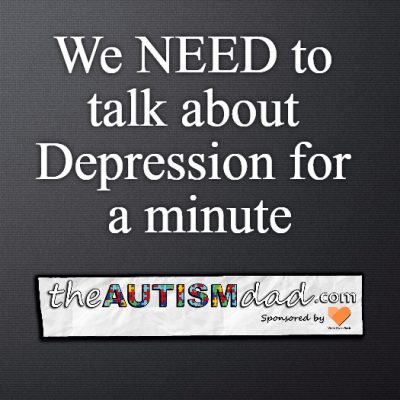[vc_row][vc_column][vc_column_text]It’s occurred to me that I need to speak to you about Depression. Even in this day and age, there is still so much misinformation and stigma floating around.
I’ve always been very open and honest about how Depression impacts my life. It’s not something people, in general, like to talk about because of the stigma and judgment that can sometimes occur if or when they do.
My war with Depression began twenty-five years ago when I was in my teens.
I had experienced trauma that sorta changed the way I viewed the world. Since that time, I’ve fought many battles against my Depression. Some of those battles were won, and some were lost, but the war rages on, even today.
Throughout the years, I’ve been on antidepressants as needed or recommended by my doctor. Medication has helped a great deal by correcting the chemical imbalance in my brain, responsible for my being depressed but it’s not a perfect solution.
I’ve come to realize a few things as the result of my education as a Forensic Psych major, my personal experience fighting many battles with Depression and from being in counseling for most of my adult life. Depression can be different for everyone. That’s an immense reality that I think is often overlooked.
'The only thing that I will say is it's absolutely imperative of everyone who thinks they might be depressed, to talk to someone about it. It could be a family member or friend but talking to your doctor is probably the best bet.' -Rob GorskiClick To TweetAlong with Depression having the ability to impact people in different ways, effective treatments can vary as well. In other words, not everyone benefits from the same treatments. There are always going to be overlaps or common threads that connect people with Depression, but there can be differences as well.
The core treatments usually involve medication, counseling and lifestyle changes. One of these treatments or some combination thereof is generally effective for many people. That being said, there are some people that many only need medication to feel better or can manage their depression with lifestyle changes. There’s no way to know what will work for someone until they begin to seeking treatment. Honestly, there’s an element of trial and error involved in this.
There’s no quick fix for dealing with Depression, and as someone who’s been dealing with this for a very long time, I would be very careful about telling someone else what they should or shouldn’t do in regards to treatment. The only thing that I will say is imperative for anyone who thinks they might be depressed, is to talk to someone about it. It could be a family member or friend but talking to your doctor is probably the best bet.
I’m a perfect example of not responding to conventional treatments and I know I’m not the only one.
I’ve been taking Paxil and Wellbutrin for a long time, and it’s helped me. I’m not someone who benefits from talking to just anyone. For me, I need to talk to someone who truly knows me and my situation. I hate feeling like someone is only there because they’re being paid to listen. It’s just how I work, and it’s always been that way.
What I’ve found to be the most effective for me is a combination of medication, exercise, lifestyle changes (when possible) and talking to someone if or when I need to.




I completely agree with you that anyone who thinks they may be depressed should seek help. That said, I have a question. You mention that your depression started after you experienced a trauma, but then say it’s biochemical and that there is no root cause to address. So if it was a trauma which first brought it out, why do you think there’s no root to it? Wouldn’t the trauma be the root? That’s pretty much what Braden, Jimmy Rock, and I were saying in the post which inspired this one.
I completely agree with you that anyone who thinks they may be depressed should seek help. That said, I have a question. You mention that your depression started after you experienced a trauma, but then say it’s biochemical and that there is no root cause to address. So if it was a trauma which first brought it out, why do you think there’s no root to it? Wouldn’t the trauma be the root? That’s pretty much what Braden, Jimmy Rock, and I were saying in the post which inspired this one.